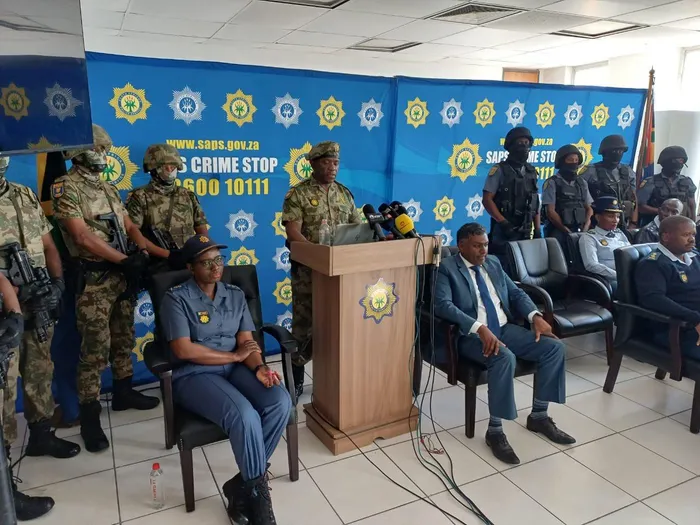121 Police Dockets: Political murders and the links to tenders and corruption

The 121 dockets related to political killings are at the centre of allegations made by KwaZulu-Natal provincial commissioner Nhlanhla Mkhwanazi.
Image: SAPS
About 50 of the 121 dockets meant for Madlanga Commission deal with political murders involving councillors and political office bearers while 42 of them are related to the killing of traditional leaders in KwaZulu-Natal.
This information was revealed by a source who said these murders involve politicians and business people.
This after police on Wednesday confirmed that the commission will receive copies of the 121 dockets linked to political killings, while the original files remain with the KwaZulu-Natal Political Killings Task Team.
The decision came after Police Minister Professor Firoz Cachalia and National Police Commissioner General Fannie Masemola agreed to submit the dockets to the commission.
This follows a meeting between the two on Monday.
Cachalia and Masemola recently clashed over Masemola’s handling of the dockets and Masemola’s decision to return them to the Political Killings Task Team.
Cachalia condemned Masemola’s decision to revive the investigation and transfer the dockets without informing him, viewing it as undermining the ministerial office.
Police spokesperson Athlenda Mathe said the dockets include 107 murders, four attempted murders, two of conspiracy to commit murder and two cases of pointing a firearm.
The dockets are at the centre of allegations made by KwaZulu-Natal provincial commissioner Nhlanhla Mkhwanazi, who claimed that suspended Police Minister, Senzo Mchunu, interfered with police operations by ordering the disbandment of the Political Killings Task Team.
Mkhwanazi claimed that on Mchunu’s orders, Deputy National Commissioner Lieutenant-General Shadrack Sibiya, who is also suspended, had the 121 case dockets removed from the task team, effectively halting investigations.
Mkhwanazi claimed Mchunu was protecting politically connected individuals from prosecution.
As a result, President Cyril Ramaphosa established the Madlanga Commission, to be chaired by Justice Mbuyiseli Madlanga, to investigate the allegations.
However, Mathe said the dockets had been sitting at the police head office in Pretoria since March, after the task team was disbanded. She added that this was tantamount to defeating the end of justice and that the legal team warned of civil litigation from the families of victims.
The source told Independent Media that some dockets were completed, and some will be referred to inquests while arrests would be made against some suspects.
The source said the cases involving councillors are related to tenders, while others are related to the battle for positions.
“Councillors have access to money through tenders and the murder of traditional leaders is purely about positions because they own land, and benefit through it,’’ said the source, adding that some politicians were killed for their leadership style.
The source also revealed that hitmen were paid between R5,000 and R60,000.
He also claimed that the removal of the dockets from the task team to the head office was influenced by the ongoing investigations in Gauteng. He said this is because there was a belief that the 121 dockets also involve cases in Gauteng.
“Those people (Machunu and Sibiya) were suspended because they were interfering with the cases in Gauteng. Gauteng has bigger names and stories. This includes politicians, business people and other who are influential,” said the source, adding that the focus is on KwaZulu-Natal but the rot in Gauteng is deeper.
Asked to comment on the claims, Mathe declined to comment, saying these aspects will be discussed before the commission.
Former SAPS whistleblower Patricia Mashale said the commission should also investigate intimidation of suspects while certified fraud examiner, Paul O’Sullivan, said the dockets accused the task team of torturing certain suspects to extract information.
Crime expert and KZN violence monitor Mary de Haas said while the task team claimed success in their investigations, only a few cases were taken to the court. She said implicated politicians faced charges but the cases were never investigated.
The Independent Police Investigative Directorate (IPID) confirmed that there are investigations against some members of the task task team.
“However, it should be noted that the President has instituted a commission to investigate allegations involving some members of the police services and the operations of their units,’’ said spokesperson Lizzy Suping, adding that the directorate position is that “we” need to allow the commission process to unfold.
Political analyst Zakhele Ndlovu said it was not surprising that the killings also involve the killing of office bearers, adding that this is because some deal with tender approvals.
“In Mpumalanga province we saw office bearers being assassinated over the issuing of tenders. Remember that Babita Deokaran from the Gauteng Health Department was killed (for investigating corruption). It's going to be interesting to see how the commission deals with these issues,’’ he said.
Meanwhile, Gauteng Premier Panyaza Lesufi announced that the province will establish its own Political Killings Task Team within the next four weeks to investigate politically motivated murders dating back to 2010.
Lesufi, made the announcement during a media briefing following the Gauteng Executive Council (Exco) Lekgotla, saying the ANC observed and noted the number of political killings in the province.
He said the province has lost countless councillors, government officials and staff members employed by local government agencies or state institutions.